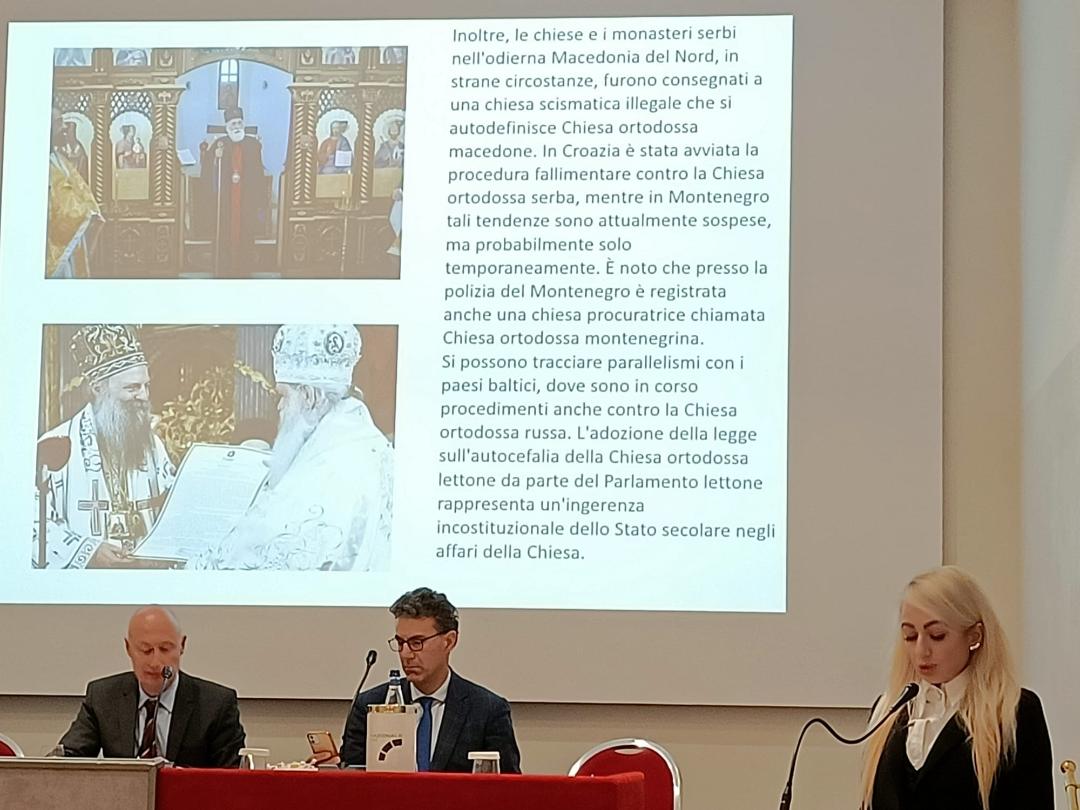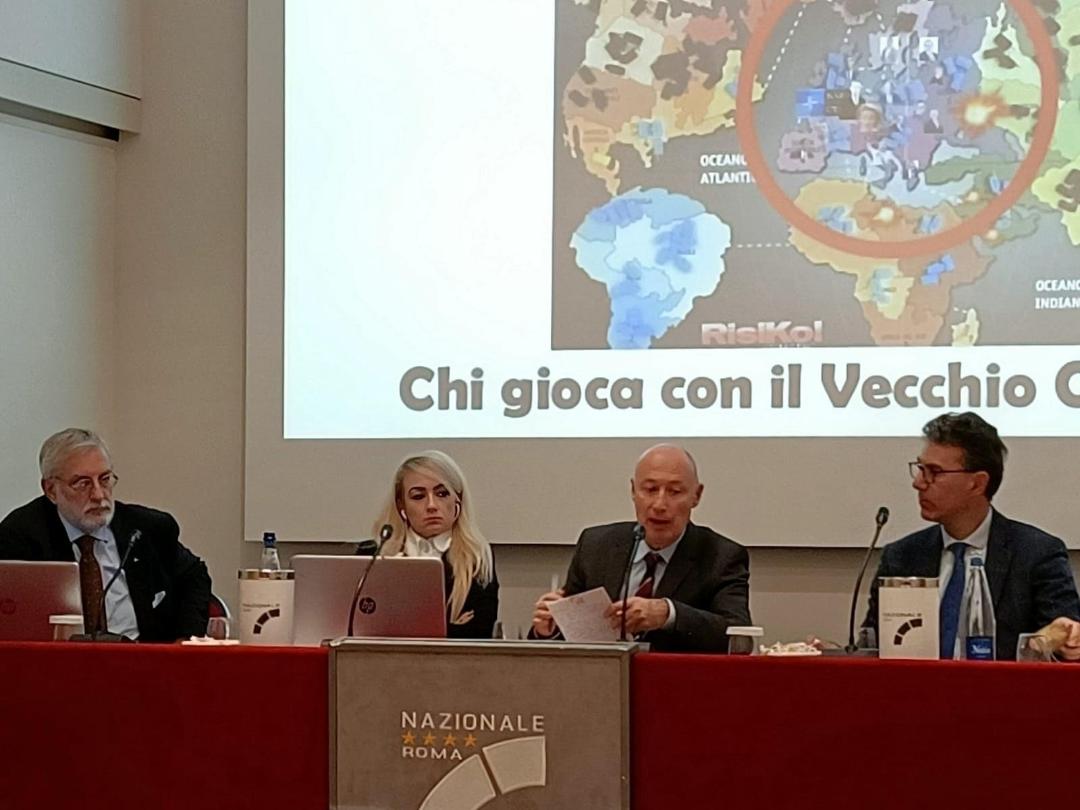On Monday 27 November, in the Sala Capranichetta of the Hotel Nazionale in ROME (Piazza Montecitorio 101), the round table organized by the Eurasia Mediterranean Study Center in collaboration with Polis Etica was held, entitled:
“EUROPEAN SECURITY OR INSECURITY? In search of lost stability”
Three hours of talks with the interventions of the following guests:
Gen. Piero LAPORTA – former Division Gen., Italian Army General Staff –
Lieutenant Colonel Fabio FILOMENI – Parachute raider (reserve officer) –
Dr. Federico DE RENZI – head of CeSEM Turan area –
Dr. Marco PALOMBI – Economist, expert in war economics –
Prof. Alexandre DEL VALLE – specialist in geopolitics and the Middle East, professor in Rome and Paris –
Prof. Dragana TRIFKOVIC – director of the Center for Geostrategic Studies in Belgrade –
Prof. Nino GALLONI – Economist, former director general at the Ministry of Labor and Economy.
S.E. Metropolitan ANTONJI, president of the Department for External Ecclesiastical Relations of the Patriarchate of Moscow, was unable to speak because he was busy in Vienna at an important meeting but still wanted to convey his greetings to the participants in the conference.
The second part, Question Time with questions to the speakers from journalists and the public, was curated by Dr. Guido De Simone, entrepreneur and founder of Polis Etica.
What are the topics that were discussed during the conference?
- a) Problem of the reception of migrants (to which are added Ukrainian refugees) and the supply of weapons by Italy and European countries to Ukraine. Do these weapons often end up in the hands of those fighting in the Middle East or other theaters of war? How many foreign fighters are there in Ukraine[1]?
- b) Can the European Union and the United States assist Israel militarily and economically in addition to Ukraine? (NATO’s military arsenals are practically empty)[2]. Is it possible to find a solution to put an end to the conflict in Europe as soon as possible? In this regard, the Hungarian Foreign Minister Péter Szijjártó proposed Budapest as a place for mediation and negotiations diplomatic[3], while President Viktor Orban added that Russia cannot be defeated militarily and peace talks are needed;
- c) Large-scale violation of human rights and religious freedom in Ukraine, in particular with the ban and physical attacks on the Orthodox Church. Similar episodes have also occurred in recent years in the Balkans, in particular in Macedonia and Montenegro[4]: yet religious freedom should be one of the cornerstones of European thought;
- d) Energy problem: is a solution possible without Russia? Should we put an end to the sanctions regime against Moscow as Indian Foreign Minister Subrahmanyam Jaishankar recently called for[5]? According to a European study, at least 100 billion have been lost by our companies in Russia due to direct sanctions but if we count the indirect losses we are talking about around 2,500 billion euros[6]. Can we compete in a war economy?
- e) Is Europe obliged to fight for Ukraine as the United States of America wants? Can Europe instead remain neutral, preserve its originality and identity, communicating amicably with Russia and China, embracing the idea of multipolarism which is now preferred by 80% of the world? Isn’t it perhaps better for Italy to return to the multi-vector politics that characterized it even during the “cold war” between the USA and the USSR?
On the contrary, in recent days we have witnessed positions taken in a completely different direction. The head of the Italian government, Giorgia Meloni, after abstaining on the UN Resolution calling for a ceasefire in Gaza, explained how the Ukrainian crisis could be resolved simply with the withdrawal of Russian troops[7].
Just as the tragedy in Palestine did not begin on October 7, the Ukrainian crisis did not erupt on February 24, 2022.
But the position taken by the Government of Rome was not the only one.
In a Germany torn by recession due to sanctions on Russia, a CFR report has warned Europe that within five years Russian troops will be able to defeat NATO militarily, so: “With its ambitions imperial forces, Russia represents the greatest and most urgent threat to NATO countries. Once the intense fighting in Ukraine is over, it could take the Moscow regime six to 10 years to rebuild its armed forces. Within this time, Germany and NATO must allow their armed forces to act as a deterrent and, if necessary, fight against Russia. Only then will they be able to reduce the risk of another war breaking out in Europe[8].”
The President of the Czech Republic thus deduced that it is necessary to prepare European soldiers to confront those of Moscow on the battlefield: “Having said this, we must be aware that in the future we could find ourselves in a situation in which the United States will be more committed elsewhere and Europe will need some kind of military action, so if we don’t want to depend completely from Washington we should develop the sectors in which we are lacking today, namely strategic transport, particularly air transport, strategic communication and strategic intelligence. There is no need to propose something new, but the European Union must be stronger within NATO.”
Summary of reports of 27 November 2023 and Final Resolution:
Given that
Today there is no Western strategy to get out of the current situation of global chaos; for the United States it is a priority to fight Russia without involving its own territory but using the European one. The Atlantic world’s greatest fear is that a defeat for Ukraine could lead to a collapse of NATO, to the point that there has even been talk of using a nuclear bomb to avert it. The Palestinian front was opened by the USA to sow further confusion, but if the West cannot manage the Gaza Strip, how do they expect to govern the world?
The conflict in Ukraine was prompted by NATO’s eastward expansion following the fall of the Berlin Wall. This does not correspond to the Italian national interest. Today the Italian army has a maximum of 8,000 soldiers in full efficiency and it would take at least 10-15 years for an overall reform of our Armed Forces. Italy does not have a belligerent vocation but only a defensive one, in line with the Constitution; rather than thinking about integrating into a European army, whose sole objective could only be a conflict against Eurasian countries, it is preferable to strengthen the navy to guard the 8,000 km. of coast.
The world is returning to its origins: today there is a small part of aggressive countries and the vast majority of the planet that only wants to trade peacefully. Italy cannot have a leading role as long as it remains tied to the external Atlantic constraint and is part of a political-military bloc, the one led by the United States, defined as “desperate” by its own protagonists (Henry Kissinger). To escape the fate of a North American aircraft carrier in the Mediterranean, Rome should look to Ankara; the latter, while remaining in NATO, is capable of safeguarding its national interest and concretely influencing nearby geopolitical scenarios.
Whereas
In its attempt to win the “new cold war” against competing powers, economic competition was no longer enough and therefore it moved on to increasing military spending and conflicts on the ground (Ukraine and Israel). We thus entered a war economy and the United States gave rise to a financial mobilization never seen before. To survive, Europe could only project itself towards the Mediterranean but while China tries to keep it a stable theater, the United States fuels conflict. Furthermore, the choice of total opposition to Russia has failed: Moscow’s economy is expanding, Putin’s popularity is still high, while European GDP growth has been killed by the economic war.
Europe’s two fundamental errors concern precisely the lack of dialogue with Russia after 1989 and its monetarist choice. After 2008, the rift between finance and the real economy, inherited from the subordination to the US model, became increasingly evident; therefore, monetary sovereignty should first be recovered and resources should subsequently be injected into the real economy, financing goods such as public health, cultural heritage and education. Can Italy do this while remaining within the parameters imposed by the European Union? Surely not.
Europe is not only under attack from an economic point of view but also from a spiritual one. For a part of the West, Orthodoxy represents a greater danger than Islamic fundamentalism. Examples have been seen in Kosovo and Metohija, in Macedonia, in Montenegro and more recently in some Baltic countries. The US secret services have worked to create schismatic churches for geopolitical purposes; in particular, the Ukrainian Parliament approved a law on the ban on the Orthodox Church, arousing the reaction of the Russian Orthodox Church which published a document in which it supports a notion of human rights linked to morality.

This is even more dramatic in a Europe already lacking true spirituality and lacking a concrete identity. The European Union has simply joined the bandwagon of US-led capitalist globalization and has tried to export the values of liberal individualism to the countries of the global South, but has not proven capable of even integrating the migrants it has welcomed. In order to achieve their own geopolitical goals and expand NATO to the East, the West had no qualms about financing, training and arming Islamic fundamentalism against Russia, China and the non-aligned Arab nations themselves, with the result of finding themselves radical terrorism at home.
We invite the Italian and European institutions
to adopt the political change that our people desire, both in Rome and in Brussels. There is another vision based on peaceful coexistence between states with different systems. We are not adversaries and enemies of Russia, China or Palestine, but their potential economic and cultural partners.
Geopolitical ignorance and Atlantic subjection are luxuries that Italy can no longer afford if it wants to survive as a nation.
The Europe of the geopolitical double standard makes no historical sense.
We invite the Italian and European parliamentary groups to finally embark on the path towards a future of peace and progress for the planet, starting with the implementation of serious diplomatic negotiations in Ukraine and Palestine in order to guarantee stability and security for all the actors involved.
Centro Studi Eurasia Mediterraneo – www.cese-m.eu
[1] Giuliano Bifolchi, Risk Assessment: foreign fighters, battaglioni di volontari in Ucraina e minaccia terroristica, “Special Eurasia”, 5 febbraio 2023.
[2] Pietro Orizio, Forniture militari scadenti all’Ucraina: le responsabilità di alleati e contractor, “Analisi Difesa”, 7 luglio 2023.
[3] Foreign Minister calls for end to Russia-Ukraine war at Minsk conference, abouthungary.hu, 27 ottobre 2023. Cfr. anche Nicholas Vinocur, Hungary’s Viktor Orbán threatens to blow up EU’s Ukraine policy, politico.eu, 22 novembre 2023.
[4] Stefano Vernole, La difesa della Chiesa Ortodossa in Montenegro, Anteo, Cavriago, 2020.
[5] India contained global inflation by buying Russian oil: Jaishankar, Press Insider, 17 novembre 2023.
[6] European companies suffer €100bn hit from Russia operations, “Financial Times”, 6 agosto 2023. Cfr. Deutscher Bundestag, Auswirkungen von Sanktionen auf die europäische und russische Wirtschaft, 21 luglio 2023.
[7] Meloni, Putin al G20 per avere visibilità politica. Se vuole la pace basta che ritiri le truppe dall’Ucraina, ANSA, 22 novembre 2023.
[8] Dr. Christian Mölling Torben Schütz, Preventing the Next War Germany and NATO Are in a Race Against Time, German Council of Foreign Relations, 8 novembre 2023.

